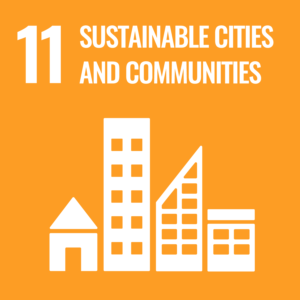SDG11: Sustainable Cities and Communities
The University is committed to making its Estate, Northampton Town, and South-East Midlands inclusive, safe, resilient and sustainable. We look to achieve this through continued engagement and partnership building at a local and regional level.

Sustainable practices
The University recognises that its activities can have a negative impact on the environment, both locally and globally and is committed to mitigating against these by making sustainable development an integral part of its operations.
The former campuses (Park and Avenue) of University of Northampton were a collection of buildings developed and refurbished over time. Avenue Campus was built in the 1920s as Northampton Technical College and Park Campus arose from a College of Education which was created in the 1970s in a parkland on the outskirts of the Town in an area called Kingsthorpe. In May 2013, a decision was made by the Board of Governors to start anew with a brand-new purpose-built University Campus on a brownfield site closer to the town.
The new Waterside Campus, which is open to the public, is located along the River Nene, a short walk to the town centre, surrounded by green parks and situated in a landscape of natural, cultural and historical significance. Costing over £330 million, the campus was built to BREEAM sustainable construction standard (buildings (Creative Hub, Learning Hub, Senate) and Student Union), and completed in time to receive students in October 2018. The development involved the remediation of ex-industrial land and the creation of new University buildings and landscape within the 58-acre site. The Campus includes a number of pedestrian and cycle paths which connect Northampton town centre with Delapre Abbey.
Before the Waterside development received planning approval, there were numerous environmental impact assessments and landscape planning design strategies developed in partnership with local authorities, Environment Agency and stakeholders. Examples include flood prevention and response plans, historical monument assessments and ecological surveys were commissioned and designing the campus with pedestrians in mind using the principles of Manual for Streets making Waterside a no-car campus.
As part of our wellbeing activities and allowing access to open and green spaces we have adapted and expanded the Memorial Garden situated on Nunn Mills Island, relocating benches from our Park and Avenue Campuses. This garden is open to the public, as well as the University community and is often used by members of the public after visiting Beckett Park.
The Waterside Campus has been purpose-built with an intelligent technology infrastructure in place enabling the University to support new ways of teaching, learning and working. This put the University in a strong position when responding to the challenges of the COVID-19 pandemic, staff are able to work and teach remotely and to allow our courses to continue to be based on our Active Blended Learning approach.
To ensure students, staff, visitors and the local community around our campus are safe the University operates a 24/7 University Security Team. To further strengthen safety and security on and around campus, the University partnered with Northamptonshire Police as part of the Safer Routes Home Project to create a University Police Team.
Please check out our latest research for SDG11: Sustainable Cities and Communities